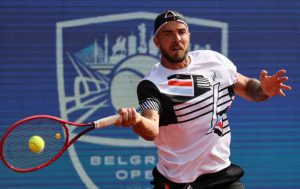During the ATP Cup, three weeks ago, Alexander Zverev lost three consecutive matches. He hit numerous double faults. He made his own father cry in a courtside argument. On Friday, the German takes to the Rod Laver Arena to take on Dominic Thiem in the Australian Open semifinals.
There were very few people talking about Zverev coming into this tournament. In fact, a lot of experts were picking Zverev to be one of the first high seeds to exit the tournament. Far more discussion was occurring over what was wrong with the young German than the impact he could have at Melbourne Park.
Alexander Zverev’s march to the semifinals
In retrospect, Zverev’s impact in Melbourne was always likely to stretch at least until the fourth round. The defeats at the ATP Cup, as difficult and demoralizing as they seemed at the time, were against talents of the caliber of Denis Shapovalov, Alex De Minaur, and Stefanos Tsitsipas. The first-round draw against Marco Cecchinato would have been a welcome change of pace for Zverev.
Straightforward victories against Egor Gerasimov and a fading Fernando Verdasco followed. The fact that Zverev made these victories into dominant ones is praiseworthy though. The German was beginning to develop a reputation of finding difficulty in the early rounds of Grand Slams. The amount of energy Zverev would spend unnecessarily in these matches would inevitably come back to hurt him in the second week of slams.
The extra energy certainly came in handy when facing up to Andrey Rublev. The young Russian hadn’t lost a tennis match in 2020 until Zverev beat him easily in straight sets. Wawrinka finally took a set off the German in the quarterfinal but Zverev showed impressive composure to turn things around quickly and assert himself once more.
Almost every aspect of Zverev’s game has shown improvement
Zverev has won fifteen out of sixteen sets and has only had to play two tiebreaks in those sets. This demonstrates that his return game is working well. He has broken his opponents 28.6% of the time. This figure is up around 5% from his career numbers on hard court.
In a previous article, there was a demonstration of how Zverev’s serve had gradually diminished over the previous year or two. In this tournament, that trend has been completely reversed. Zverev has made his first serve 79% of the time, which is an incredibly high number. He has won 79% of the points behind that first serve as well. Whilst not quite as impressive behind his second delivery (51% points won behind that) it is surely much better than his atrocious double fault record in the ATP Cup. In fact, he hit no double faults at all against Gerasimov in round two.
When the serve is working so well Zverev becomes an extremely difficult opponent. He has held almost 90% of his service games, so combining that with the return game working better than usual it is clear how he has progressed so far, so well.
Zverev has been remarkably consistent throughout his matches. In all of the Australian Open matches so far he has managed a winner count in the high 30s. He has also shown consistency in his unforced errors, always keeping that count much lower, in the low 20s.
Calmer demeanour on court
It is difficult to know whether it is these obvious improvements in his game that has led to his noticeably calmer demeanour on court or whether there were personal discussions had within his team on this issue. It was clear in the ATP Cup that things could not progress as they were.
The wider tennis world will never know what was said behind closed doors, and neither should they, but it would be a surprise if “clear the air” talks hadn’t happened within Team Zverev. They have certainly worked hard together. When Zverev was asked about the improvement in his game he referenced the fact that he was doing six or seven-hour sessions to fix things.
It is great to see a real talent able to work hard. It would have been easy for Zverev to bury himself in denial that things were wrong. Perhaps it took such a disastrous ATP Cup campaign to bring things to a head. Either way, the German is back at the danger end of a Grand Slam with a chance to win his first.
Charitable donation a pressure reliever?
The bushfires that have engulfed Australia over the summer have brought out some of the best in the tennis players. Many have offered to donate per ace hit, Simona Halep promised to donate every time she had an altercation with her coach Darren Cahill. Belinda Bencic poked some fun at Zverev, suggesting he could donate for every double fault.
Thankfully, due to his lack of doubles, Zverev hasn’t done that. Instead, he has donated $10,000AUS for every match win. Not only this but incredibly, after his victory against Cecchinato Zverev made the huge commitment to donate his entire winners’ cheque to the relief fund. In 2020, this prize money totals almost $4.2 million AUS. It is possible that these charitable donations have somewhat relieved the pressure on the young man.
Of course, Zverev has two very tough matches to go before that becomes a consideration. Up next is Dominic Thiem, who has his own extra motivation for victory. The differing motivations between the semifinalists succinctly summed up in this tweet by Ricky Dimon:
Australian Open semifinal: Alexander Zverev vs. Dominic Thiem
– one is two wins away from donating 4 million dollars in an effort to save life as we know it on an entire continent
– the other is two wins away from having his mom get a kangaroo tattoo on her butt
😂
— Ricky Dimon (@Dimonator) January 29, 2020
Whatever does happen in the semifinal and final it is good to see Alexander Zverev back playing well and in the business end of tournaments.
Main Photo from Getty.






